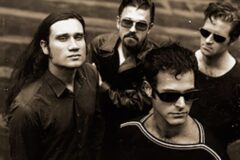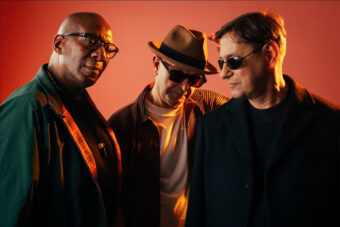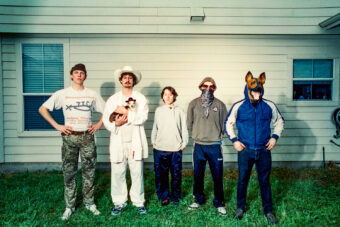“How many people here speak French?” asked Sean Lennon of the 10,000 fans attending the Hollywood Bowl Sunday night to celebrate the music of French singer-provocateur Serge Gainsbourg. The occasion marked the twentieth anniversary of his death, as well as the fortieth anniversary of his most revered album, 1971’s smoking orchestral-psych masterpiece Histoire de Melody Nelson. A roar of affirmation arose from the crowd and Lennon continued: “Great, can you give me some lessons after the concert? I don’t understand what I’m singing.” Like many English-speaking musicians, he gushed about adoring the man’s music even if he couldn’t quite grasp its literal meaning.
That didn’t stop Lennon and Charlotte Kemp-Muhl, as well as Beck Hansen, Grizzly Bear’s Ed Droste, Beach House’s Victoria Legrand, former Faith No More frontman Mike Patton, Zola Jesus, and Gainsbourg’s son, Lulu, from taking the stage to pay tribute to one of France’s great pop icons. And perhaps more than a few would blush if they knew the lyrical content of Melody Nelson, in which a lecherous old man runs over a teenage girl with his Rolls Royce, ravishes her in a hotel room, and falls in love with her, only to have her die in a plane crash, where her body is then worshipped by the tribes of Papua New Guinea. Perhaps it makes more sense in French?
While Gainsbourg is mostly unknown in the U.S., except for being the father of Charlotte Gainsbourg and for this notorious TV moment with Whitney Houston, that hasn’t stopped musicians the world over from drawing upon his music. Bands as diverse as Portishead and De La Soul have sampled Melody Nelson, while artists ranging from Cat Power to France’s first lady Carla Bruni have sung his words. Jarvis Cocker’s sing-speak in Pulp and Marc Almond’s decadent pop would be far less trenchant without Gainsbourg’s influence. But Beck has been the most vocal in his adoration, with the orchestral arrangements of Melody‘s finale, “Cargo Cult,” being lifted wholesale for Sea Change song “Paper Tiger.”

Also Read
30 Overlooked 1994 Albums Turning 30
Saturday, Beck lent his pipes to a few of Serge’s teeny-bop numbers, and he reassembled his “Paper Tiger” backing band (along with Bill Withers’ funky drummer James Gadson) to lead the night’s charge – along with Melody‘s original arranger-composer, Jean Claude Vannier, on hand to conduct the Hollywood Bowl Orchestra. There was also the Cal State University Fullerton Choir to provide backup. All proved needed, as there was a great deal of ground to cover, from Serge’s psychedelic soundtrack work to Afro-Cuban jazz to a frothy disco number sung by Legrand and Zola Jesus.
Mike Patton’s deep growl was best suited for Serge’s lecherous work; he was able to veer from id-like depths into supper club crooner territory in a breath. Droste reached the honeyed center of a ballad like “I Came Here to Say I’m Going Away,” but Legrand was the vocal highlight of the night, swerving from schoolgirl innocence on the Melody Nelson numbers to smoky assurance on songs like “Initials BB.”
The performer who received the loudest hoots of the night, however, was none of the above. It was child actor-turned-breakout star Joseph Gordon-Levitt (Inception), who was added at the last moment to provide the seductive narration of Melody Nelson‘s epic opening and closing track, with a choir joining for the album and concert’s transcendent final moments.
It was fitting tribute that it took a Hollywood star, the son of a rock legend, an alternative music icon, three women, and an avant-garde weirdo to approximate the man’s indelible mark on alternative music.
In a pre-concert interview, Beck spoke of how important Gainsbourg was for his own artistic trajectory. “Serge had this chameleon-like way of traversing these eras while keeping his identity so firmly established throughout,” he told me. “It was an example of someone who had given himself that kind of permission or leeway to explore whatever he wanted to. Discovering his music gave me an example of a way that could work.”
In much the same way that Gainsbourg had moved from Beat-inspired jazz to bubblegum and even into reggae and new wave, so too would Beck mutate from a folkie into a hip-hopper into a master of pastiche into whatever shape he chooses next.




